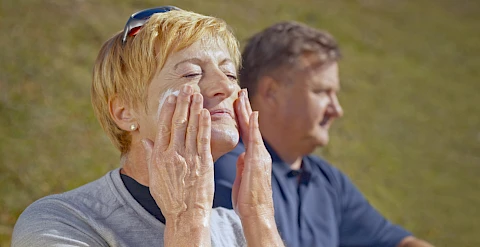
As the summer sun shines brightly, it's a wonderful time for seniors to enjoy outdoor activities. Whether it's a walk in the park or a family picnic, stay sun-safe. Let's explore some essential tips to keep you safe while you enjoy the great outdoors.
The Importance of Sunscreen
Sunscreen is a must for everyone, but especially for seniors. Older skin is more susceptible to sun damage, which can lead to skin cancer and other health issues. As you age, your skin becomes thinner and more fragile, making it easier for harmful UV rays to penetrate and cause damage. Regular use of sunscreen can protect your skin from these harmful effects. It's advisable to use sunscreen with at least SPF 30. SPF 50 is even better, especially if you will be spending extended time outdoors. Look for broad-spectrum sunscreens that protect against both UVA and UVB rays. Apply sunscreen generously on all exposed skin about 20 minutes before heading outdoors. Don't forget often-missed spots like the ears, the back of the neck, and the tops of your feet. You need to reapply every two hours and immediately after swimming or sweating.
Protective Clothing
In addition to sunscreen, wearing the right clothing can significantly enhance your protection from the sun. Clothes can act as a physical barrier between your skin and the sun's rays. Unlike sunscreen, they don't need to be reapplied and provide consistent protection. Opt for long-sleeved shirts and long pants made of tightly woven fabrics. Darker colors and special UV-blocking garments offer the best protection. A wide-brimmed hat can shield your face, ears, and neck. Sunglasses that block 100% UV rays protect your eyes and reduce the risk of cataracts and other eye damage.
Staying Hydrated
Seniors need to remain hydrated. Dehydration can occur quickly and lead to serious health issues. Seniors often have a lower volume of water in their bodies, and some medications can increase the risk of dehydration. Staying hydrated helps regulate body temperature, keeps joints lubricated, and maintains overall health. Common signs include dry mouth, dark urine, dizziness, and fatigue. Severe dehydration can lead to confusion, rapid heartbeat, and even fainting. Carry a water bottle with you and sip throughout the day. Eat water-rich foods like fruits and vegetables, and avoid drinks with caffeine and alcohol, as they can be dehydrating.
Timing and Planning Outdoor Activities
Strategic planning can help minimize your exposure to harmful sun rays. Early morning (before 10 a.m.) and late afternoon (after 4 p.m.) are the best times to avoid peak sun intensity. If you must be outdoors during midday, try to stay in shaded areas and limit your time under direct sunlight. Regular breaks in the shade can help you cool down and give your skin a rest from constant sun exposure. Bringing along an umbrella or portable shade can be beneficial.
Senior Helpers Springfield-Manassas, VA, Helps Seniors Practice Sun Safety
Enjoying the outdoors safely is all about being prepared. Remember to use sunscreen, wear protective clothing, stay hydrated, and plan your activities wisely. These steps can help you enjoy summer safely. For more information on senior care services in Ashburn, Burke, Fairfax Station, Fort Belvoir, and Leesburg, don't hesitate to contact Senior Helpers Springfield-Manassas, VA.